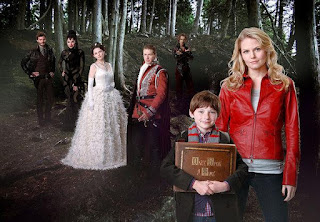 We watched the first episode of Once Upon a Time on ABC out of curiosity, my wife and I. We have become strangely enamored of the series. I won't belabor the plot here; if you haven't been watching and are curious, click on the link above, where you can watch past episodes.
We watched the first episode of Once Upon a Time on ABC out of curiosity, my wife and I. We have become strangely enamored of the series. I won't belabor the plot here; if you haven't been watching and are curious, click on the link above, where you can watch past episodes.The show is very well written, by the writers of Lost, in which you were never sure if the protagonists were even alive (spoiler: they weren't). This series presents a different take on favorite fairy tales of our childhood. As children, we loved it when Cinderella has her "happy ever after", and Snow White is awakened by a kiss (Sleeping Beauty, too, in a curious variant on Snow White). When we grew up, most of us never gave it another thought.
Some years ago, I realized that fairy tales and ghost stories and other fantastical childhood tales are really about coming to terms with the world as we find it. Giant-killer stories are about coping with adults when we were tiny; Cinderella and similar stories are about overcoming early handicaps (sometimes with magical help, sometimes not); dragon stories are about learning to control our inner dragons; and tales of defeating trolls and ogres are mostly wish-fulfillment, as they seldom give us genuine skills needed to deal with schoolyard bullies.
 The writers of Once have taken a different tack. Their version of childhood classics is edgier, darker. Snow White, a fugitive from the Queen, is a highway robber. Cinderella makes a deal with Rumpelstiltskin, who is surprisingly willing to tell his name (will they bring in the spinning-straw-into-gold story?), after he disposes of her fairy Godmother.
The writers of Once have taken a different tack. Their version of childhood classics is edgier, darker. Snow White, a fugitive from the Queen, is a highway robber. Cinderella makes a deal with Rumpelstiltskin, who is surprisingly willing to tell his name (will they bring in the spinning-straw-into-gold story?), after he disposes of her fairy Godmother.What is really going on here? It seems most of the conventional fairy tales lacked a Trickster, a figure such as Loki (of Norse mythology). Even when one appeared (Rumpelstiltskin), he was tricked in the end and overcome. But we all grew up and found out that happy endings are hard to come by. We don't kill any giants, we become giants and learn the reasons why our parents were so unreasonable, as seen by tiny minds. The trolls and ogres win all the fights, and in the world of work, we find they all have become middle managers who control our yearly progress reviews. And the dragon? Our personal dragon has lost the power to breathe fire, and had its wings clipped. When we do breathe a little fire, we get a stern e-mail from HR demanding we attend "sensitivity training" courses.
In Norse mythology, Loki wins, though at the end, even he is defeated by the Frost Giants. I do anticipate this element informs the ABC series. The strongest wizard, even stronger than the Queen, is Rumpelstiltskin. His mantra matches our experience: There is a price to be paid. Magic doesn't come free.
Let's see, the next episode is scheduled for Nov 27 – ABC will set it aside on the 20th in favor of the Music Awards. That gives us time for just four episodes before Christmas, and since the following Sunday is New Years' day, I reckon four is all that there are. Four episodes to wrap up the tales, defeat the Queen, and – you can bet on it – throw in a twist at the end, such as the Trickster getting away, to set things up for a follow-on season.



No comments:
Post a Comment